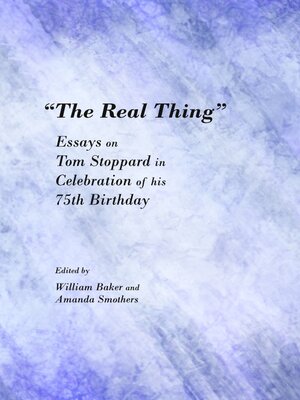"The Real Thing"
ebook ∣ Essays on Tom Stoppard in Celebration of his 75th Birthday
By William Baker

Sign up to save your library
With an OverDrive account, you can save your favorite libraries for at-a-glance information about availability. Find out more about OverDrive accounts.
Find this title in Libby, the library reading app by OverDrive.



Search for a digital library with this title
Title found at these libraries:
| Loading... |
With a writing career spanning over half a century and encompassing media as diverse as conferences, radio, journalism, fiction, theatre, film, and television, Tom Stoppard is probably the most prolific and significant living British dramatist. The critical essays in this volume celebrating Stoppard's 75th birthday address many facets of Stoppard's work, both the well-known, such as Rosencrantz and Guildenstern are Dead and Shakespeare in Love, as well as the relatively critically neglected, including his novel Lord Malquist and Mr. Moon and his short stories, "The Story," "Life, Times: Fragments," and "Reunion."The essays presented here analyze plays such as Arcadia, The Invention of Love, The Real Thing, and Jumpers, Stoppard's film adaptation of J. G. Ballard's Empire of the Sun, his television adaptation of Ford Madox Ford's Parade's End, and his stage adaptations of Chekhov's plays Ivanov, The Seagull, and The Cherry Orchard, as well as his own theatrical trilogy on Russian history, The Coast of Utopia (Voyage, Shipwreck, and Salvage). Also included is an interview with Tom Stoppard on the 16 November 1982 debut of his play The Real Thing at Strand Theatre, London, and a detailed account of the Stoppard holdings in the Harry Ransom Center at the University of Texas at Austin.From his fascination with Shakespeare and other historical figures (and time periods) to his exploration of the connection between poetic creativity and scholarship to his predilection for word play, verbal ambiguity and use of anachronism, Stoppard's work is at once insightful and wry, thought-provoking and entertaining, earnest and facetious. The critical essays in this volume hope to do justice to the brilliant complexity that is Tom Stoppard's body of work.






